Using AI to listen to Jordan’s date palms
An app can detect invisible killers, prevent the drenching of plantations in insecticides and save farmers from catastrophic losses.
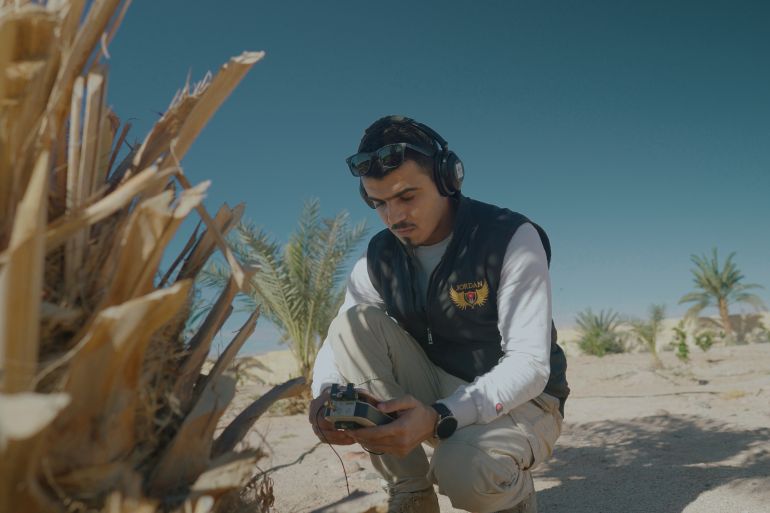
Amman, Jordan – Zeid Sinokrot was an unemployed engineer in 2012 when he decided to join the family business, growing dates on a farm outside Jericho.
But his father’s date palms began dying one by one, consumed from the inside by insects that were impossible to see until the trees began to keel over. Four years later, his father sold the farm.
Keep reading
list of 4 itemsBoeing’s jets turn 70: A timeline of highs, lows and turbulence
US university ties to weapons contractors under scrutiny amid war in Gaza
Scientists discover sperm whale ‘phonetic alphabet’
“I knew I wanted to find a solution to the problem,” Sinokrot told Al Jazeera. “Trees were falling, and farmers were afraid.”
The Sinokrot’s farm was under attack from the red palm weevil, a small insect native to South Asia that attacks more than 40 types of palms and causes more than $1bn in losses in the Middle East, Africa, and North America annually. The pests spend 80 percent of their lives inside trees and are almost invisible until it’s too late, leaving farmers with few defences aside from drenching their fields in pesticides as a preventive measure.
But smart farming that uses AI for pest detection is helping farmers and the Jordanian government fight back without chemicals, and Sinokrot is leading the charge.
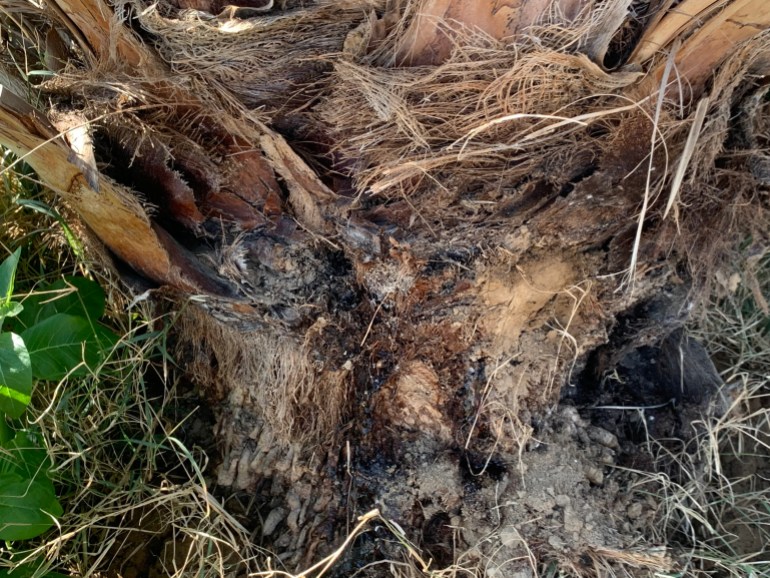
His startup, Palmear, uses acoustic AI to decipher tiny noises within trees and find early signs of infestation. In November, the Jordanian Ministry of Agriculture began partnering with Palmear to monitor, prevent and treat weevil infestations. The ministry now has a dashboard that shows all the trees that have been screened with AI and is gearing up to cover the entire country using a combination of data from farmers and ministry employees.
Sinokrot estimates that 16 percent of date palms in the country are currently being monitored through Palmear, either by private farmers or the ministry. Farmers using Palmear often scan their trees every 45 days, and the information is automatically shared with the ministry to track any spread.
“Early detection and treatment are the most important things to us,” Imad Al-Awad, director of Plant Protection and Phytosanitation at the agriculture ministry, told Al Jazeera. “We benefit a lot from this AI to know if there’s a hot spot. We can warn people about it and protect the date industry.”
Bringing AI to the farm
On a frigid morning in January, Sinokrot visited Hatem Dabash at his small date farm in the Jordan Valley. The burned-out husk of a palm tree lay behind them as they spoke, its hollowed-out trunk a sure sign of the decay left by the red palm weevil.
“The weevils are a dangerous problem,” said Dabash as he strolled through rows of palm trees on his farm. “If left unchecked, it would spread through the entire area. It’s a constant battle.”
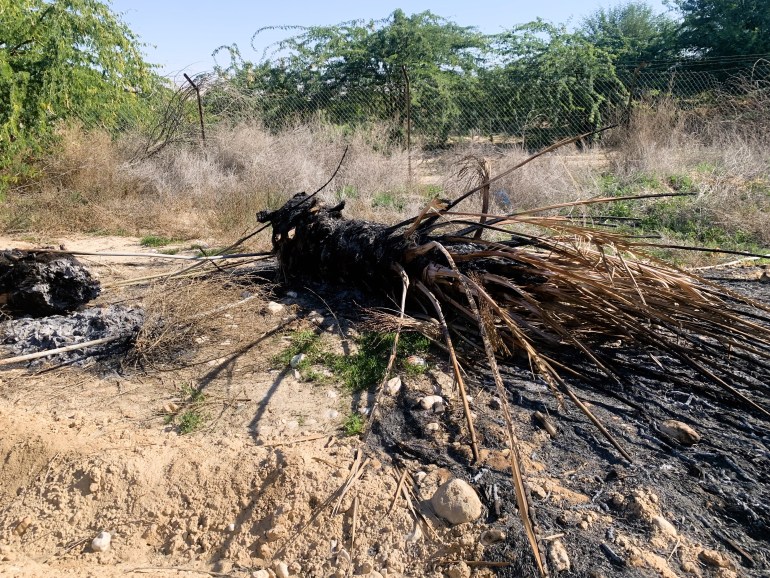
Like other farmers under attack from the weevils, Dabash burned the badly infected palm tree last year to prevent further spread. That tree was the worst out of several weevil infestation cases Dabash faced last year. He treated the others with strong insecticides. Although they killed the weevils inside his palms, they also tainted his dates with noxious chemicals, ruining his harvest for the year. Following a full pesticide treatment, trees need several months before they can produce dates that are safe to eat. By then, the harvest window has closed.
To reduce these risks, Dabash welcomed the use of AI to monitor his trees. It allows him to catch any cases early and treat them before the insects can spread to nearby trees.
Red palm weevils lay eggs deep within the palm tree trunks. Then their larvae eat through the tree, destroying it from the inside.
The surface shows no signs of weevils until the palm tree reaches an advanced stage of infestation, leading panicked farmers to drench their fields in pesticides.
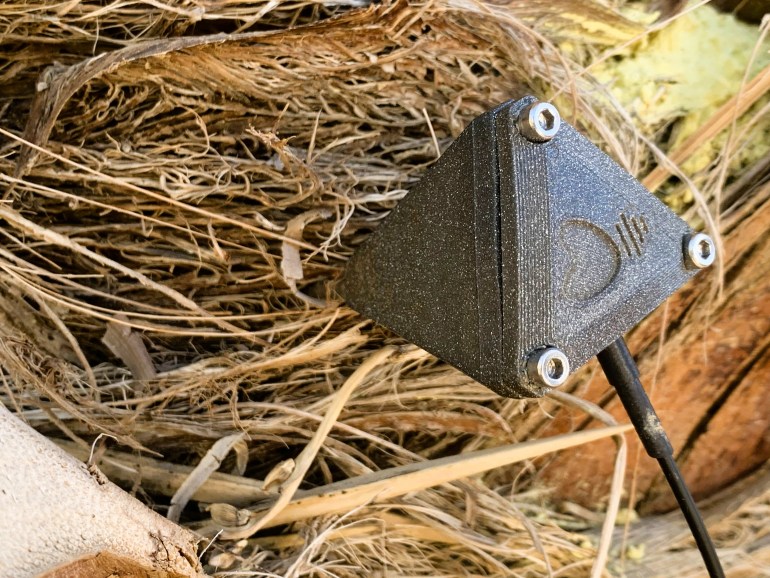
But Sinokrot and his team arrived to help Dabash without chemicals. They crouched down and slid a needle through the soft, patchy bark on the bottom of the tree. Using a small microphone in the head of the needle, they listened to the tree. At less than two weeks old, red palm weevil larvae make tiny noises as they chew away at tree trunks. Sinokrot’s handheld device can capture these sounds and filter them through an algorithm in the Palmear app.
After a few seconds, a green check mark appeared on Sinokrot’s mobile phone, and Dabash breathed a sigh of relief. The tree was healthy.
Developing AI
To build their technology, Sinokrot and his colleagues needed to capture weevil noises and train their algorithm to detect infestations before they became visible. “We lived with the bugs to understand them,” Sinokrot told Al Jazeera, flipping through pictures of larvae.
His team started growing date palms in small sound-proof rooms in the basement of their shared house in the Jordan Valley. They then raised weevil larvae and artificially infected the palms, using high-powered microphones to listen as the bugs feasted. These recordings became the basis of their algorithm, which can identify weevils from a quick soundbite.
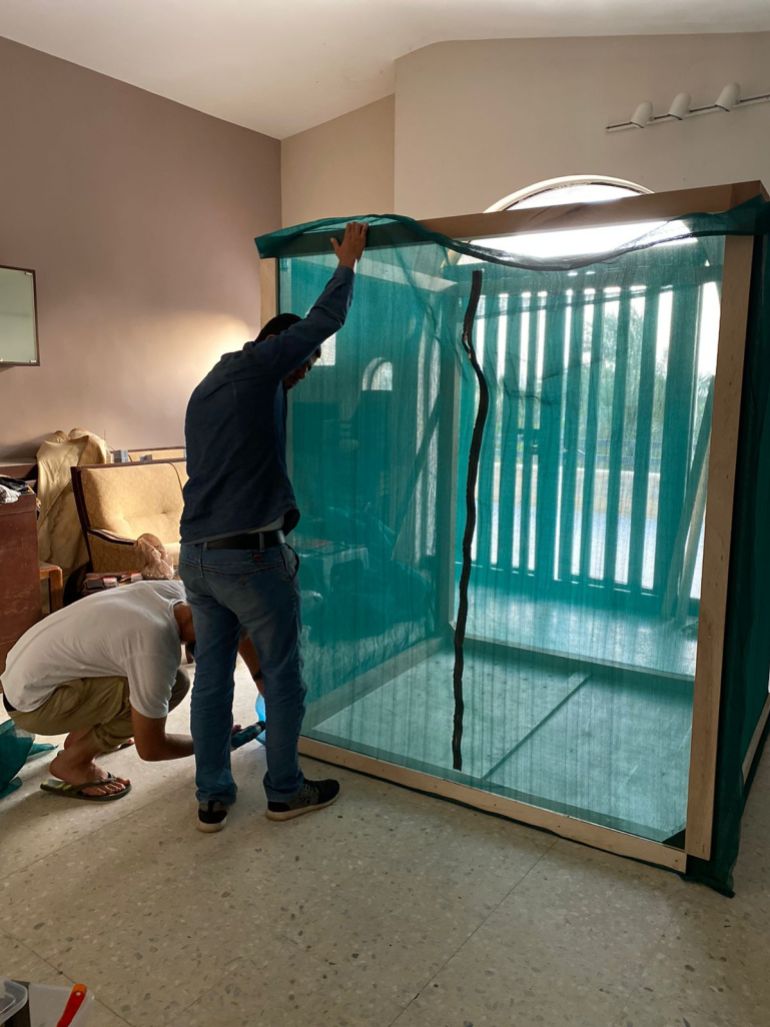
Their work has grown since those days in the basement, and now larger plantations have acquired their own Palmear devices to monitor their palms. But for smaller farmers like Dabash, Sinokrot and his team make periodic visits to scan the trees, keeping costs down.
Sinokrot and his team are scaling up the technology. They are aiming to mass-manufacture the sensors so that even more farmers can download the app, monitor their trees and share data with the agriculture ministry. The Palmear team also hopes to establish similar monitoring systems in other countries suffering from weevil infestations.
Palmear is part of a burgeoning AI farming market that analysts expect to top $2.5bn by 2025. Other types of smart farming use advanced imaging and soil sensors.
“Palmear is using data science in a very smart and helpful way,” said Naihla Al-Madi, associate professor in computing sciences and head of the Data Science Department at Princess Sumaya University in Amman. “I tell my students that if you have a computer and you have the data, the path is open for innovation.”
Tiny, unfamiliar enemies
Invasive insects cost the global economy around $70bn a year, and those losses are expected to increase by 36 percent by 2050, largely due to global warming. That means farmers will be increasingly at war with tiny, unfamiliar enemies.
Although the red palm weevil comes from Southeast Asia, the insects can fly up to 50km (30 miles) a day, enabling them to spread across East Asia, North Africa, North America, Europe and the Middle East. A single female weevil can lay up to 300 eggs inside a palm trunk.
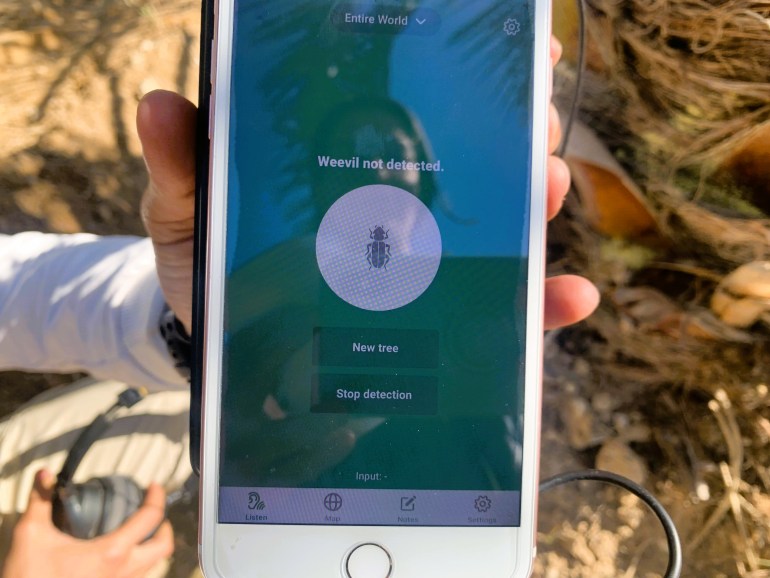
“We need to take a proactive approach to these insects because there are large crop losses,” said Hiba Obeidat, a pest control engineer at Jordan’s Ministry of Agriculture.
As the weevils topple trees around the world, they are simultaneously releasing carbon dioxide into the air and accelerating global warming. The conventional solution of turning to pesticides often makes matters worse, killing valuable pollinators like bees and releasing chemicals into the surrounding environment.
“The issue with pesticides, in general, is that they can linger in the environment,” said Timothy Purvis, an environmental researcher based in Jordan. “It reaches a point where it’s leaking into other ecosystems.”
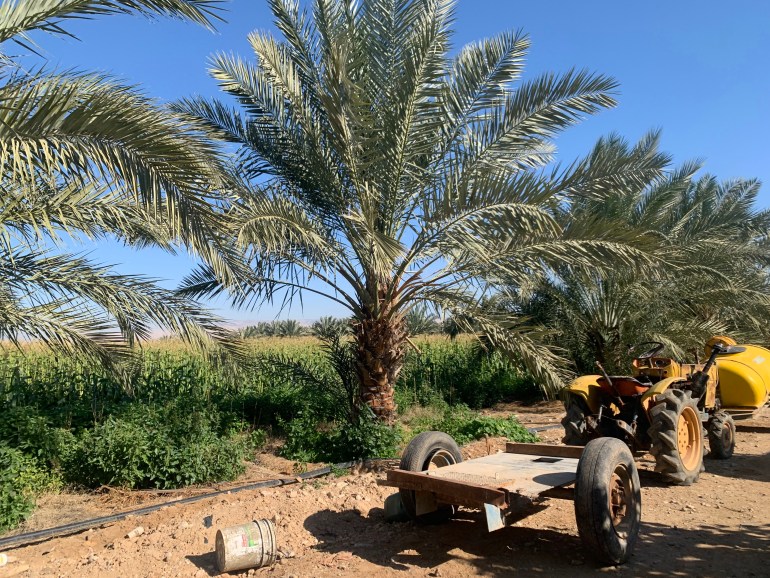
Farmers typically treat date palms with preventive pesticides five times a year. AI monitoring has helped reduce the farmers’ use of these preventive chemicals by an average of 40 percent although the exact amounts vary by farm. The technology helps farmers use techniques like precision spraying to target specific areas in a field as well.
Some farmers have nearly eliminated their use of insecticides. According to Ibrahim Kilani, an environmental engineer in Jordan: “AI-powered tools can help farmers make more informed decisions about when and where to apply pesticides, reducing the risk of over-application and minimising their impact on the environment.”
The reduction in pesticides can improve soil and water quality, boosting the health of surrounding ecosystems and agricultural areas.
Saving the dates
Jordan produced about 30,000 tonnes of dates in 2021 and exported around 30 percent of its harvest, according to the Jordan Dates Association. Yearly sales in the Jordanian date sector total around $140m.
Although other types of insects, like the pollen worm, also threaten palms, the red palm weevils are the single most destructive pests for 40 types of trees in different parts of the world.
Al-Awad estimated that the red palm weevils threaten about 4,900 hectares (12,100 acres) of land and about 700,000 trees. With each tree valued at about $700, the risk to Jordan’s economy could reach nearly half a billion dollars if left unmonitored and untreated.
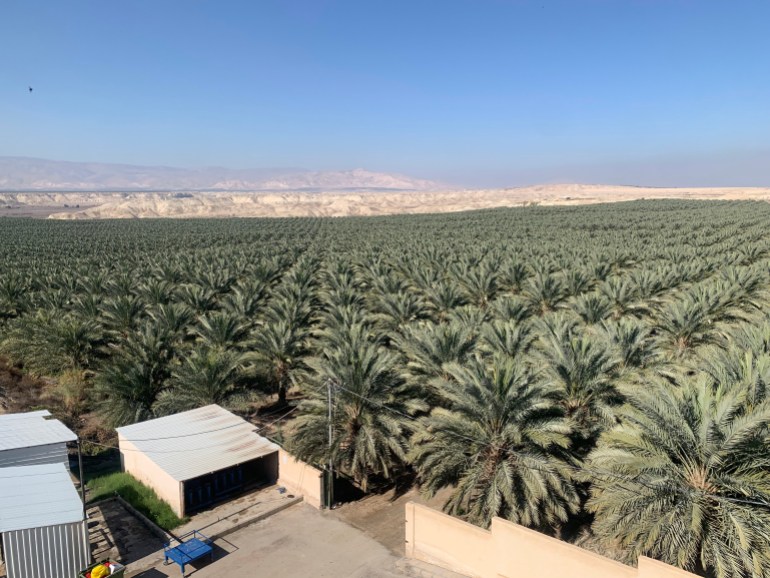
But it’s more than that: For Jordanians, a historic plant is at stake. “Jordan is famous for the Dead Sea, Petra and Medjool dates,” said Yazan Nabulsi, a stakeholder in the Medjool Village date plantation, which has nearly 20,000 trees. AI has helped him screen trees and perform targeted treatments, cutting the plantation’s use of chemicals by more than 30 percent.
Ahmad Al Falah Tamara Farms, a large plantation with more than 10,000 trees, has nearly stopped using insecticides because of the technology.
“We’re proud of the impact we’re having on the environment,” said Anais Al-Ghananim, an agricultural engineer who works with Palmear. “We started it here in Jordan, and we’re excited for it to spread to the whole world.”